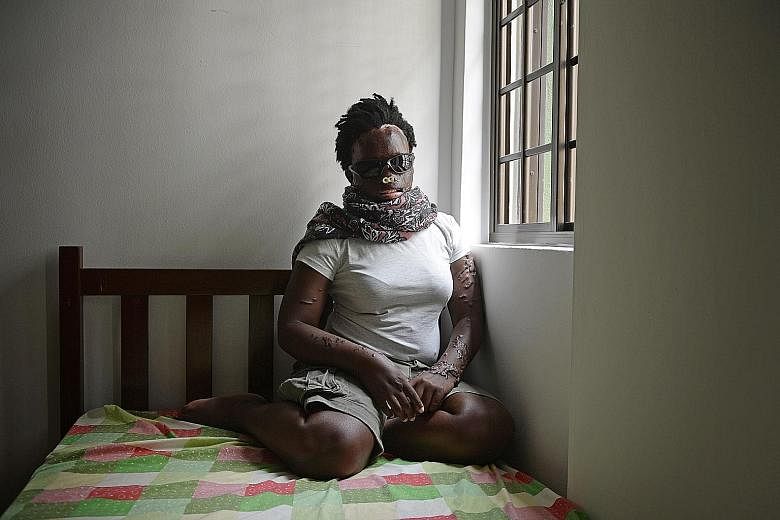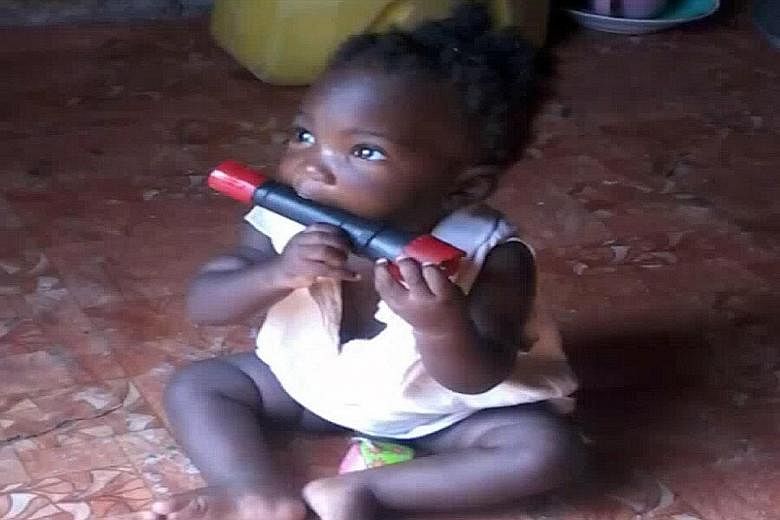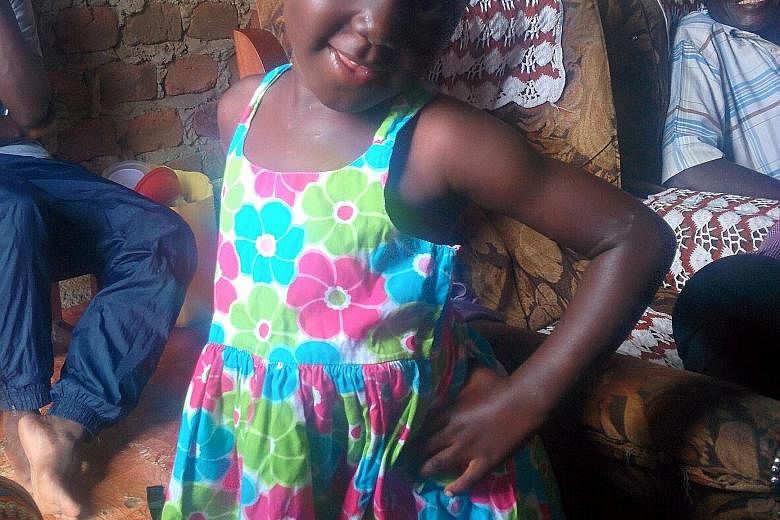When Ms Namale Allen left Uganda for Singapore earlier this month, she nursed a big hope.
Face and body horrifyingly disfigured in a brutal acid attack in May last year, the former hairdresser prayed that her sight could be restored by prominent eye surgeon Donald Tan through a highly complex procedure.
More than anything, she wanted to lay eyes on her one-year-old daughter Janat, whom she was carrying in her womb when she was attacked outside her home by a stranger.
Tragically, Ms Allen, 27, will not get to do that.
Professor Tan, who had offered to review her case and treat her pro bono, did not have good news for her. After a series of tests and scans, he told her on Tuesday last week that osteo-odonto-keratoprosthesis (OOKP) - her best shot at regaining her sight - was futile.
Also known as "tooth-in-eye" surgery, OOKP is a highly complicated operation which involves reconstructing a new eye by using a tiny plastic lens and one of the patient's own teeth.
Among other problems, her cornea had shrunk too drastically, her eyeballs were too perforated and her optic nerves too damaged for the procedure.
The verdict devastated Ms Allen, whose story appeared in The Straits Times last month.
She was at her home in Kampala - the capital city of Uganda - one evening in May last year when she heard a male voice asking her to go outside. Carrying her elder four-year-old daughter on her hip, she went to check who it was, only to have a large amount of acid flung at her by a young man she did not know. He was never caught.
Her daughter escaped with minor injuries but the attack melted Ms Allen's facial features and blinded her. What were once her eyes are now two pinholes. She needs plugs to breathe through her collapsed nose. Large keloids - looking like patches of melted wax - cover her neck, arms and shoulders, making movement difficult and painful.
Her husband abandoned her, and Ms Allen and her daughters now live with her parents.
Readers and good Samaritans later raised about $80,000 through several online donation drives for her medical expenses and her trip to Singapore. Lawyer-turned-chef Willin Low raised more than $20,000 after setting up GiveAsia.org, while a group of expatriate housewives raised another US$41,000 (S$58,300).
For more than an hour after Prof Tan delivered his crushing verdict, Ms Allen cried and wailed inconsolably at his clinic at the National Eye Centre in Outram.
Humanitarian and social activist Lynsay Lewis, who accompanied Ms Allen to Singapore, told The Sunday Times: "The times in my life when I have heard and felt the heart-rending grief of true despair and loss... I experienced them again that morning."
That whole day, Ms Allen refused food and drink. Her grief wore her out; she slept for 14 hours that night.
The next day at noon, Ms Lewis found her sitting, legs crossed, on her bed silently sobbing.
"She asked why God had let this happen to her, and why he healed other people and not her. I just put my arms around her and held her for a very long time."
Not long after, they were joined by Mr Innocent Rwamwiza, a medical officer from Uganda who has also accompanied Ms Allen on this trip.
Said Ms Lewis: "He told her we were all here for her, that she had family and new friends in Singapore who cared for her, and that we would not abandon her. After that, she calmed down a lot."
Yesterday, in the apartment, provided by The Salvation Army during her stay in Singapore, Ms Allen looked calm and composed.
She has, she said, come to terms with Prof Tan's diagnosis.
"It took me two days to accept that it was what it was," she said through Mr Rwamiza, 34, who is also her interpreter. "I will now shift my attention towards the future."
Ms Allen seems to have got off to a good start. On Friday, for the first time since the attack, she decided to do some of the things she used to do before.
"I braided a friend's hair and I tried to cook some potatoes with vegetables," she let on. "It was not that difficult. I could not see but I could still use my other senses, like touch."
She told The Sunday Times that many people have rallied around her during her stay here. Among those who came to encourage her was Mr Jason Setok, 36.
A former software engineer who lost his sight about 10 years ago because of glaucoma, he told her that acceptance was crucial in her recovery. "He also told me that I can still achieve my dreams," said Ms Allen, who hopes to go back to hairdressing one day. "I have more than 100 ideas of doing hair in my head."
Although she hopes to keep busy and stay positive when she returns to Uganda, she confesses to having some worries.
"I will need support to raise my two daughters," she said, referring to Shifra, now aged five, and Janat. I want them to be educated. I hope one of them will be a doctor, and another one, a surveyor."
Although her sight cannot be restored, she hopes that doctors in Singapore can help her with the other issues plaguing her after the attack. She will stay here until she has received all necessary treatments.
"I hope they can repair my nose and my mouth," said Ms Allen, who has difficulties breathing and eating. "The keloids are restricting my neck movement and they are also painful and itchy."
Dr Choong Ee Cherk, a plastic surgeon from Tan Tock Seng Hospital (TTSH), has examined her and is currently trying to work out with his team what surgical options are viable. Another plastic surgeon from Singapore General Hospital has also offered to review her case and work with the TTSH team.
Ms Lewis said: "The surgeons are willing to donate their time but we will have to pay for hospital charges and other expenses."
The founder of Upasuaji Africa, a charity promoting surgical education in East Africa, added the donations raised for Ms Allen will go towards her medical expenses, blind training, and education for her two daughters. Excess funds will go towards the setting up of burns units in Uganda.
Meanwhile, Ms Allen refuses to lose hope despite Prof Tan's diagnosis. "I will still pray that, one day, I will be able to see again."




